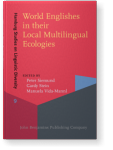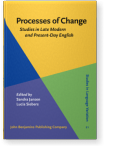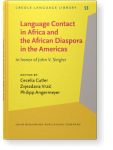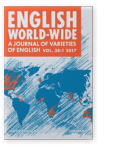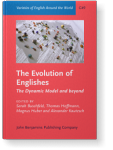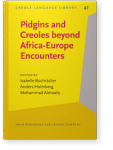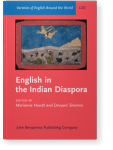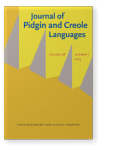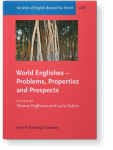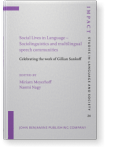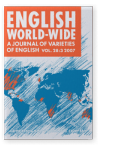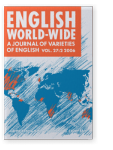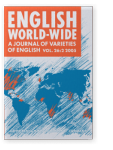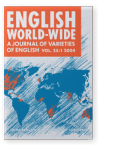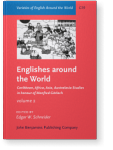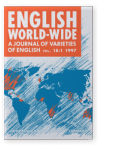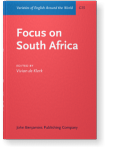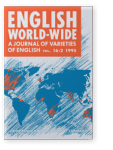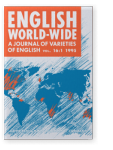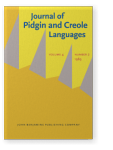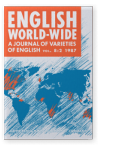Rajend Mesthrie
List of John Benjamins publications for which Rajend Mesthrie plays a role.
Book series
Journal
ISSN 0172-8865 | E-ISSN 1569-9730
Titles
Introducing Sociolinguistics: Second Edition
Rajend Mesthrie, Joan Swann, Ana Deumert and William L. Leap
[Not in series, 102] 2009. xxvi, 502 pp.
Subjects Sociolinguistics and Dialectology
Introducing Sociolinguistics
Rajend Mesthrie, Joan Swann, Ana Deumert and William L. Leap
[Not in series, 102 (1st)] 2000. 528 pp.
Subjects Sociolinguistics and Dialectology
2025 Chapter 2. World Englishes and the third space: Insights from multilingual practices in Xhosa and English World Englishes in their Local Multilingual Ecologies, Siemund, Peter, Gardy Stein and Manuela Vida-Mannl (eds.), pp. 20–37 | Chapter
This chapter takes as its starting point the further spread of English since the new millennium in terms of both breadth and depth. The language continues to be favored in international education, media and cross-cultural communication, even as other languages continue at more local levels, and… read more
2019 Chapter 12. The goose vowel in South African English with special reference to Coloured communities in 5 cities Processes of Change: Studies in Late Modern and Present-Day English, Jansen, Sandra and Lucia Siebers (eds.), pp. 227–246 | Chapter
This paper adds to the South African and international literature on the fronting of /u:/ in present day English. It investigates the extent to which varieties of South African English spoken by “Coloured” people participate in GOOSE fronting, which has been noted as a notable characteristic of the… read more
2017 Pidginization versus second language acquisition: Insights from basilang and mesolang varieties of Zulu as a second language Language Contact in Africa and the African Diaspora in the Americas: In honor of John V. Singler, Cutler, Cecelia, Zvjezdana Vrzić and Philipp Angermeyer (eds.), pp. 323–342 | Chapter
This paper describes a mid-range (or mesolang) version of Zulu as a second language, acquired ‘naturally’ in a rural area by an Indian South African. Particular attention is paid to the morphology of an agglutinating target language, in relation to the acquisition of an elaborate system of prefixes… read more
2017 Braj B. Kachru (1932–2016) English World-Wide 38:1, pp. 1–4 | Obituary
2014 The sociophonetic effects of Event X: Post-apartheid Black South African English in multicultural contact with other South African Englishes The Evolution of Englishes: The Dynamic Model and beyond, Buschfeld, Sarah, Thomas Hoffmann, Magnus Huber and Alexander Kautzsch (eds.), pp. 58–69 | Article
South Africa offers an ecological complexity that challenges World Englishes theorizing. The number of speakers of the Settler variety remains relatively large, and other L1 varieties play an important role in public life (primarily those spoken by Indian and Coloured speakers). In addition there… read more
2014 How non-Indo-European is Fanakalo pidgin? Selected understudied structures in a Bantu-lexified pidgin with Germanic substrates Pidgins and Creoles beyond Africa-Europe Encounters, Buchstaller, Isabelle, Anders Holmberg and Mohammad Almoaily (eds.), pp. 85–100 | Article
Fanakalo is a southern African pidgin whose main lexifier is Zulu, a non-Indo-European language, and whose genesis lies with Europeans as “imperfect learners” and Africans as “superstrate speakers” in the 19th CE. The question can therefore be raised whether this reversal of social relations and… read more
2014 A lesser globalisation: A sociolexical study of Indian Englishes in diaspora, with a primary focus on South Africa English in the Indian Diaspora, Hundt, Marianne and Devyani Sharma (eds.), pp. 171–186 | Article
This paper makes a case for the comparative study of Indian English vocabulary in diaspora. Comparing characteristic usage of Indian terms in their new environments reveals socio-cultural niceties that may not always be possible in studies of syntax and phonetics. The domains of food, music,… read more
2014 Sociophonetics and the Indian diaspora: The NURSE vowel and other selected features in South African Indian English English in the Indian Diaspora, Hundt, Marianne and Devyani Sharma (eds.), pp. 85–104 | Article
This chapter explores the potential of phonetic and sociophonetic research in characterising varieties of English in the Indian diaspora, using South African Indian English (SAIE) as a focal point. We first identify key phonetic features that lend themselves to such comparative study. In this… read more
2013 Slang registers, code-switching and restructured urban varieties in South Africa: An analytic overview of tsotsitaals with special reference to the Cape Town variety Journal of Pidgin and Creole Languages 28:1, pp. 103–130 | Article
This paper examines the status of an informal urban variety in Cape Town known as Tsotsitaal. Similar varieties, going by a plethora of names (Flaaitaal, Iscamtho, Ringas) have been described in other South African cities, especially Johannesburg, Pretoria and Durban (see also Sheng in Kenyan… read more
2009 4. Language variation and change Introducing Sociolinguistics: Second Edition, Mesthrie, Rajend, Joan Swann, Ana Deumert and William L. Leap, pp. 109 ff. | Article
2009 1. Clearing the ground: Basic issues, concepts and approaches Introducing Sociolinguistics: Second Edition, Mesthrie, Rajend, Joan Swann, Ana Deumert and William L. Leap, pp. 1 ff. | Article
2009 Deracialising the GOOSE vowel in South African English: Accelerated linguistic change amongst young, middle class females in post-apartheid South Africa World Englishes – Problems, Properties and Prospects: Selected papers from the 13th IAWE conference, Hoffmann, Thomas and Lucia Siebers (eds.), pp. 3–18 | Article
The practices associated with the policy of apartheid entrenched easily-identifiable ethnic varieties of English in South Africa. The collapse of the policy in the 1990s removed social barriers between people and encouraged freedom of association. With new sustained social networks have come new… read more
2009 2. Regional dialectology Introducing Sociolinguistics: Second Edition, Mesthrie, Rajend, Joan Swann, Ana Deumert and William L. Leap, pp. 42 ff. | Article
2009 3. Social dialectology Introducing Sociolinguistics: Second Edition, Mesthrie, Rajend, Joan Swann, Ana Deumert and William L. Leap, pp. 74 ff. | Article
2009 9. L anguage contact 2: Pidgins, Creoles and 'New Englishes' Introducing Sociolinguistics: Second Edition, Mesthrie, Rajend, Joan Swann, Ana Deumert and William L. Leap, pp. 271 ff. | Article
2009 10. Critical sociolinguistics: Approaches to language and power Introducing Sociolinguistics: Second Edition, Mesthrie, Rajend, Joan Swann, Ana Deumert and William L. Leap, pp. 309 ff. | Article
2009 11. Sociolinguistics and education Introducing Sociolinguistics: Second Edition, Mesthrie, Rajend, Joan Swann, Ana Deumert and William L. Leap, pp. 344 ff. | Article
2009 8. Language contact 1: Maintenance, shift and death Introducing Sociolinguistics: Second Edition, Mesthrie, Rajend, Joan Swann, Ana Deumert and William L. Leap, pp. 242 ff. | Article
2008 "I've been speaking Tsotsitaal all my life without knowing it": Towards a unified account of tsotsitaals in South Africa. Social Lives in Language – Sociolinguistics and multilingual speech communities: Celebrating the work of Gillian Sankoff, Meyerhoff, Miriam and Naomi Nagy (eds.), pp. 95–109 | Article
This chapter focuses on varieties that flourish in South African townships with names like Tsotsitaal, Flaaitaal, Iscamtho, Gamtaal etc. Some speakers and scholars argue that these are new languages arising out of urbanisation and underworld culture in multilingual settings. This chapter examines… read more
2007 Braj B. Kachru. 2005. Asian Englishes: Beyond the Canon English World-Wide 28:3, pp. 329–332 | Miscellaneous
2006 Anti-deletions in an L2 grammar: A study of Black South African English mesolect English World-Wide 27:2, pp. 111–145 | Article
This paper offers a unified account of the syntactic “deviations” found in a second language variety of English, viz. Black South African English (BlSAfE). Most writing on the topic has been content to supply lists of non-standard features which are thought to be diagnostic of the variety. This… read more
2005 Putting back the horse before the cart: The “spelling form” fallacy in Second Language Acquisition studies, with special reference to the treatment of unstressed vowels in Black South African English English World-Wide 26:2, pp. 127–151 | Article
A common assumption in studies of English world-wide is that speakers of an L2 frequently rely on the orthographic form of words in settling upon their pronunciation. I call this the “spelling form hypothesis”. This paper critically examines the assumptions behind this hypothesis and shows them to… read more
2004 Review of Bauer (2002): An Introduction to International Varieties of English English World-Wide 25:1, pp. 133–136 | Review
2000 4. Language Variation and Change Introducing Sociolinguistics, Mesthrie, Rajend, Joan Swann, Ana Deumert and William L. Leap, pp. 114 ff. | Article
2000 11. Sociolinguistics and Education Introducing Sociolinguistics, Mesthrie, Rajend, Joan Swann, Ana Deumert and William L. Leap, pp. 354 ff. | Article
2000 1. Clearing the Ground: Basic Issues, Concepts and Approaches Introducing Sociolinguistics, Mesthrie, Rajend, Joan Swann, Ana Deumert and William L. Leap, pp. 1 ff. | Article
2000 2. Regional Dialectology Introducing Sociolinguistics, Mesthrie, Rajend, Joan Swann, Ana Deumert and William L. Leap, pp. 44 ff. | Article
2000 3. Social Dialectology Introducing Sociolinguistics, Mesthrie, Rajend, Joan Swann, Ana Deumert and William L. Leap, pp. 76 ff. | Article
2000 9. Language Contact 2: Pidgins, Creoles and ‘New Englishes’ Introducing Sociolinguistics, Mesthrie, Rajend, Joan Swann, Ana Deumert and William L. Leap, pp. 279 ff. | Article
2000 10. Critical Sociolinguistics: Approaches to Language and Power Introducing Sociolinguistics, Mesthrie, Rajend, Joan Swann, Ana Deumert and William L. Leap, pp. 316 ff. | Article
2000 8. Language Contact 1: Maintenance, Shift and Death Introducing Sociolinguistics, Mesthrie, Rajend, Joan Swann, Ana Deumert and William L. Leap, pp. 248 ff. | Article
1997 A sociolinguistic study of topicalisation phenomena in South African Black English Englishes around the World: Studies in honour of Manfred Görlach, Schneider, Edgar W. (ed.), pp. 119–140 | Article
1997 Review of Silva (1996): A Dictionary of South African English on Historical Principles English World-Wide 18:1, pp. 146–151 | Review
1996 Language Contact, Transmission, Shift: South African Indian English Focus on South Africa, de Klerk, Vivian (ed.), pp. 79–98 | Article
1995 Review of Chambers (1995): Sociolinguistic Theory English World-Wide 16:2, pp. 295–299 | Review
1995 Towards a Grammar of Proto South African English English World-Wide 16:1, pp. 105–133 | Article
1989 The Origins of Fanagalo Journal of Pidgin and Creole Languages 4:2, pp. 211–240 | Article
This paper examines, and refutes, the currently most popular hypothesis concerning the origin of Fanagalo, namely, that it arose on the plantation fields of Natal among indentured East Indian migrants who arrived there from 1860 onwards. Can a pidgin be initiated by a group of migrants from… read more
1987 From OV to VO in Language Shift: South African Indian English and its OV Substrates English World-Wide 8:2, pp. 263–276 | Article
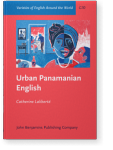
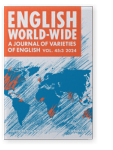
.hb.png)
